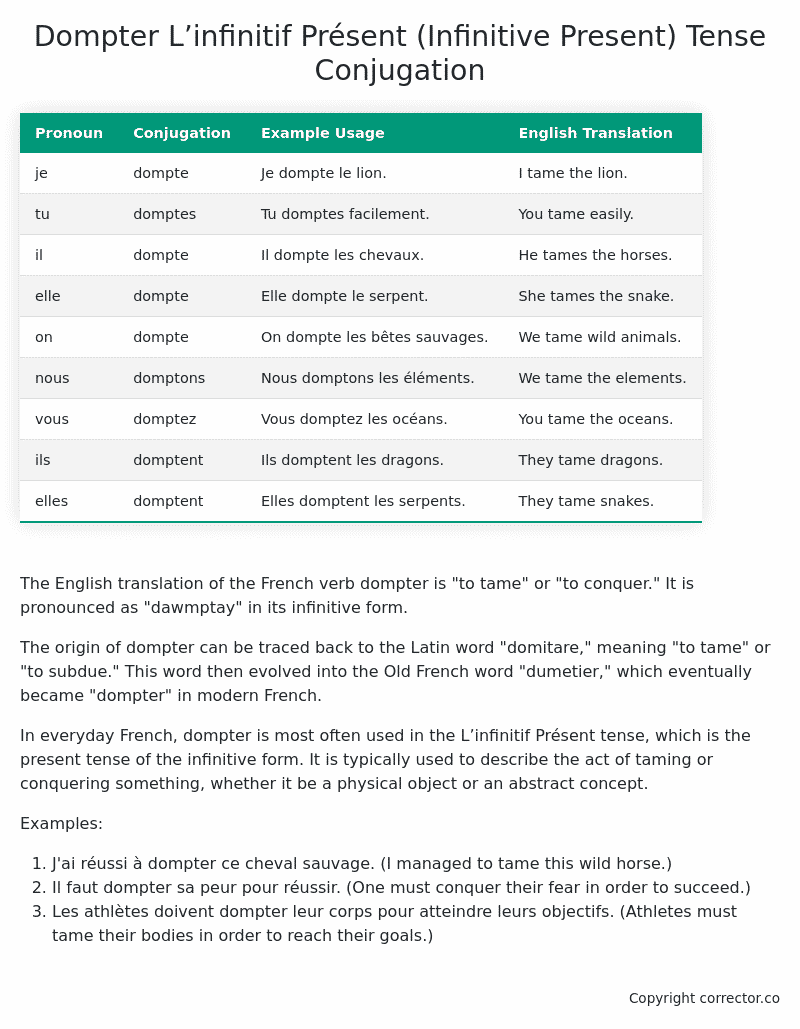L’infinitif Présent (Infinitive Present) Tense Conjugation of the French Verb dompter
Introduction to the verb dompter
The English translation of the French verb dompter is “to tame” or “to conquer.” It is pronounced as “dawmptay” in its infinitive form.
The origin of dompter can be traced back to the Latin word “domitare,” meaning “to tame” or “to subdue.” This word then evolved into the Old French word “dumetier,” which eventually became “dompter” in modern French.
In everyday French, dompter is most often used in the L’infinitif Présent tense, which is the present tense of the infinitive form. It is typically used to describe the act of taming or conquering something, whether it be a physical object or an abstract concept.
Examples:
- J’ai réussi à dompter ce cheval sauvage. (I managed to tame this wild horse.)
- Il faut dompter sa peur pour réussir. (One must conquer their fear in order to succeed.)
- Les athlètes doivent dompter leur corps pour atteindre leurs objectifs. (Athletes must tame their bodies in order to reach their goals.)
Table of the L’infinitif Présent (Infinitive Present) Tense Conjugation of dompter
| Pronoun | Conjugation | Example Usage | English Translation |
|---|---|---|---|
| je | dompte | Je dompte le lion. | I tame the lion. |
| tu | domptes | Tu domptes facilement. | You tame easily. |
| il | dompte | Il dompte les chevaux. | He tames the horses. |
| elle | dompte | Elle dompte le serpent. | She tames the snake. |
| on | dompte | On dompte les bêtes sauvages. | We tame wild animals. |
| nous | domptons | Nous domptons les éléments. | We tame the elements. |
| vous | domptez | Vous domptez les océans. | You tame the oceans. |
| ils | domptent | Ils domptent les dragons. | They tame dragons. |
| elles | domptent | Elles domptent les serpents. | They tame snakes. |
Other Conjugations for Dompter.
Le Present (Present Tense) Conjugation of the French Verb dompter
Imparfait (Imperfect) Tense Conjugation of the French Verb dompter
Passé Simple (Simple Past) Tense Conjugation of the French Verb dompter
Passé Composé (Present Perfect) Tense Conjugation of the French Verb dompter
Futur Simple (Simple Future) Tense Conjugation of the French Verb dompter
Futur Proche (Near Future) Tense Conjugation of the French Verb dompter
Plus-que-parfait (Pluperfect) Tense Conjugation of the French Verb dompter
Passé Antérieur (Past Anterior) Tense Conjugation of the French Verb dompter
Futur Antérieur (Future Anterior) Tense Conjugation of the French Verb dompter
Subjonctif Présent (Subjunctive Present) Tense Conjugation of the French Verb dompter
Subjonctif Passé (Subjunctive Past) Tense Conjugation of the French Verb dompter
Subjonctif Imparfait (Subjunctive Imperfect) Tense Conjugation of the French Verb dompter
Subjonctif Plus-que-parfait (Subjunctive Pluperfect) Tense Conjugation of the French Verb dompter
Conditionnel Présent (Conditional Present) Tense Conjugation of the French Verb dompter
Conditionnel Passé (Conditional Past) Tense Conjugation of the French Verb dompter
L’impératif Présent (Imperative Present) Tense Conjugation of the French Verb dompter
L’infinitif Présent (Infinitive Present) Tense Conjugation of the French Verb dompter (this article)
Struggling with French verbs or the language in general? Why not use our free French Grammar Checker – no registration required!
Get a FREE Download Study Sheet of this Conjugation 🔥
Simply right click the image below, click “save image” and get your free reference for the dompter L’infinitif Présent tense conjugation!

Dompter – About the French L’infinitif Présent (Infinitive Present) Tense
Forming the Infinitive Present
Common Everyday Usage Patterns
As a Verb’s Dictionary Form
After Modal Verbs
As an Imperative
In Infinitive Clauses
Interactions with Other Tenses
Present Tense
Future Tense
Conditional Tense
Passé Composé
Imperfect Tense
Subjunctive and Conditional Moods
Summary
Want More?
I hope you enjoyed this article on the verb dompter. Still in a learning mood? Check out another TOTALLY random French verb conjugation!


